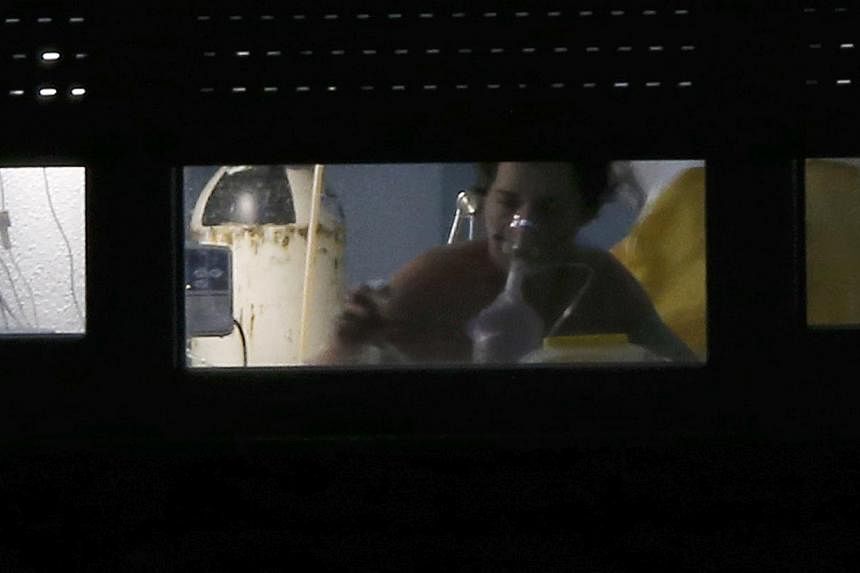MADRID (REUTERS) - The Spanish nurse infected with Ebola was conscious and sitting unaided on Saturday, as three more people joined the 13 hospitalised in Madrid to be monitored for signs of the deadly disease.
Teresa Romero, 44, is the only person known to have caught the virus outside Africa.
None of the 16 others under observation has been diagnosed with Ebola so far, though the Spanish government is under fire for its handling both of Romero's case and the threat of a wider outbreak of the disease.
Reuters images showed Romero alert and sitting upright in her hospital room with an oxygen mask strapped to her face and responding to the hospital staff attending to her.
She had taken a turn for the worse two days ago, health authorities said, and is still considered critical.
"Teresa Romero's condition has undergone no significant changes and is still serious, but stable," a government Ebola committee said in a statement on Saturday afternoon.
The latest outbreak of the disease has already killed more than 4,000 people, mostly in West Africa, and Romero's case has raised fears about contagion in Europe and elsewhere.
"The big problem is in West Africa where the doubling rate is every four weeks and it really is going up and up, so it will not be surprising if we have spillover into this country," said Sally Davies, Britain's chief medical officer.
"I would expect a handful of cases over the next few months," Davies told BBC TV after an eight-hour nationwide drill to test the country's readiness to deal with an Ebola outbreak.
Britain has said it will start screening passengers for Ebola who enter the country through London's two main airports and by railway from continental Europe.
The United States on Saturday began screening travellers from West Africa at New York's John F. Kennedy International airport.
Spain's government tightened Ebola detection protocols on Friday and tasked Deputy Prime Minister Soraya Saenz de Santamaria with responding to the health crisis, five days after the contagion was confirmed.
Romero was diagnosed with Ebola after caring for two priests who had contracted the disease in Africa and were then repatriated to Spain. Both men died, one in August and one in September.
Three more people who came into contact with Romero - a hairdresser, another nurse and a cleaner - were admitted to the isolation unit at the Carlos III hospital on Friday evening. The 13 who were already under observation include Romero's husband.
An experimental treatment, ZMab, is available in Spain for use in her case, a health source said. However, it was not clear whether she was now being given the drug. She was given antibodies from previously infected patients earlier this week.
The ZMab combination drug, made by Canada-based company Defyrus, is one of the agents used to make ZMapp, another treatment, which was developed by MappBiopharmaceutical. ZMapp has been used on some Ebola sufferers, a number of whom survived, but available supplies are exhausted.
Hospital authorities and the government declined to comment.
Amid disquiet in Spain over how the virus could have spread, some government officials initially deflected blame to the nurse, Romero, seizing on her admission that she may have touched her face with the gloves of her protective suit.
Angry health workers jeered Prime Minister Mariano Rajoy on Friday as he visited the hospital, throwing surgical gloves at his car. Unions and the public have also laid into the government for its sluggish response.
Romero remained undiagnosed for days despite reporting she had a fever, one of the symptoms of Ebola.
"The bad way this crisis was handled by politicians proved fertile ground for panic," El Mundo newspaper said on an editorial on Saturday. It described the case of one school that wanted a nurse to keep her child away, because she worked in another Madrid hospital where Romero was first admitted.
Several hundred protesters calling for government officials to step down gathered in central Madrid on Saturday evening, carrying a banner that read "We are all Teresa". Earlier in the day, animal rights campaigners demonstrated in several cities because the Madrid government had Romero's pet dog, Excalibur, put down this week, fearing it could spread the disease.
Three hairdressers were among those under observation on Saturday, after Romero visited a salon for a beauty treatment before she was diagnosed.
Patients also included five doctors, a hospital porter and four nurses, one of whom had also cared for one of the repatriated priests and tested negative for Ebola in an initial examination.
A man in one of the hospital wards cleared for the patients under observation could be seen at a window on Saturday, smiling and waving a banner which read 36.1 deg C - meaning he has no fever.

